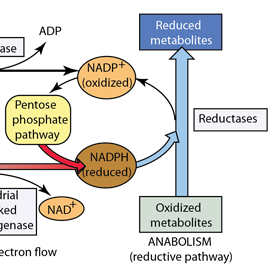The pentose phosphate pathway (PPP) is a pathway of metabolism which parallels glycolysis, but with a main function of anabolism to build molecular structures necessary for life. Although its overall result forms a reductive pathway, its first phase is oxidative as it generates NADPH. In its second phase, it synthesizes pentoses (5-carbon sugars) as well as ribose 5-phosphate, a precursor for constructing nucleotides. For most organisms, this pathway occurs in the cytoplasm, but for plants it mainly takes place in the plastids.
|  |
